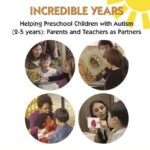The Americans with Disabilities Act was passed on July 26, 1990, and that same year, Boston became the first city to host a Disability Pride Day honoring Americans with disabilities. Today, July is officially Disability Pride Month with celebrations and other observances happening all over the country. If you’re looking for some fresh children’s reads or titles to support children in your early childhood program, you’ll find plenty to inspire in the list below. Pro-tip: Track the books you & your children are reading. Download the free app The Storygraph, created and owned by Black female tech entrepreneur Nadia Odunayo.All titles are available through the Debra S Fish Early Childhood Resource Library, a branch of the St. Paul Public Library.
Pro-tip: Track the books you & your children are reading. Download the free app The Storygraph, created and owned by Black female tech entrepreneur Nadia Odunayo.All titles are available through the Debra S Fish Early Childhood Resource Library, a branch of the St. Paul Public Library.
Children’s Titles
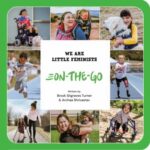 On-the-go (Age Focus: Baby – 4 Years)
On-the-go (Age Focus: Baby – 4 Years)
Beautiful, full-color photos of kids with disabilities celebrate all types of movement and mobility aids (like wheelchairs, walkers, crutches, prosthetics, and service dogs), while simple, poetic text builds both vocabulary and empathy.
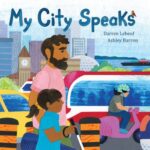 My City Speaks (Age Focus: 3 – 7 Years)
My City Speaks (Age Focus: 3 – 7 Years)
A young girl explores her city with her father, taking in all its sensory details. Her city speaks to her in so many ways: “sometimes it echoes,” and “sometimes it trills.” It “buzzes and tweets and flocks.” It’s both “busy” and “relaxed,” and “smelly” and “sweet.” In the end, we discover that the city doesn’t just speak to this inquisitive young girl – it also listens … Author Darren Lebeuf, an award-winning photographer, uses spare text and a rhythmic style to create an evocative read-aloud. The vivid adjectives, both concrete and abstract, will inspire children to try to capture in words what they notice not only in their own town or city, but in any setting. The bright, richly colored cut-paper collage illustrations by Ashley Barron add a captivating visual texture and depth to the story. The portrayal of a girl with a visual impairment walking through the city on her way to her violin recital offers a character education lesson in adaptability.
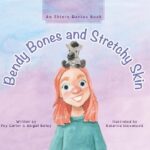 BENDY BONES AND STRETCHY SKIN (Age Focus: 4 – 8 Years)
BENDY BONES AND STRETCHY SKIN (Age Focus: 4 – 8 Years)
Inspired by the author’s real-life story about Ehlers-Danlos, this disability inclusion book for kids follows Abigail as she’s diagnosed with an invisible disability–and her friends come together to support her. When Abigail is diagnosed with Ehlers-Danlos, at first, her classmates don’t understand. Abigail doesn’t look like she has a disability. What is her special chair for? How do walk breaks help? In this kids book about disabilities, Abigail and her mom bring awareness to her invisible illness-and her friendships grow stronger because of it.
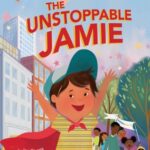 The Unstoppable Jamie (Age Focus: 4 – 8 Years)
The Unstoppable Jamie (Age Focus: 4 – 8 Years)
A child with Down syndrome learns to self-regulate during a trip to New York City.
Jamie is “unstoppable”—in fact, he’s a “SUPERHERO,” with an arsenal of gadgets. Headphones muffle loud noises, and “super focus” helps him stay calm. Most important is his red superhero cape. Jamie is so super that his photo will be displayed in Times Square as part of the Buddy Walk (backmatter explains that it’s an annual fundraiser sponsored by the National Down Syndrome Society). Mom, Dad, Jamie, and Jamie’s brother, Ben, travel to New York to see it. But when Jamie loses his headphones, the bustling big city puts his powers to the test. Amid a cacophony of sounds, Jamie huddles on the sidewalk, cape over his head. Is Jamie still a superhero? With his family’s support, Jamie realizes that he’s a superhero just for being himself. Warm, cartoon illustrations gently convey Jamie’s emotions and his family’s love. (Kirkus Reviews)
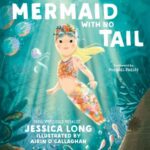 Mermaid With No Tail (Age Focus: 4 – 8 Years)
Mermaid With No Tail (Age Focus: 4 – 8 Years)
Paralympic champion swimmer and gold medalist Jessica Long celebrates the importance of dreaming big and the power of being different in The Mermaid with No Tail. As a baby, Jessica was adopted from a Russian orphanage. Her legs were amputated below the knee when she was 18 months old. Despite this, Jessica has become a world-class swimmer and one of the most decorated athletes of all time. Dive into this illustrated picture book based on Jessica’s story, where a mermaid with no tail decides she wants to compete in the Mermaid Games. The other mermaids make fun of her for being different. But her adoptive turtle parents are supportive and encouraging, and her shark coach, Phelpsy, teaches her to swim using her arms. The mermaid trains hard, maintains a good attitude, and eventually wins the games.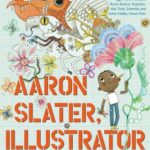 Aaron Slater, Illustrator (Age Focus: 5 – 8 Years) Recipient of a Kirkus Starred ReviewThe latest book in the Questioneer series centers an African American boy who has dyslexia.Roberts’ characteristic cartoon illustrations open on a family of six that includes two mothers of color, children of various abilities and racial presentations, and two very amused cats. In a style more expressive and stirring than other books in the series, Beaty presents a boy overcoming insecurities related to reading comprehension. Like Harlem Renaissance artist Aaron Douglas, the boy’s namesake, the protagonist loves to draw. More than drawing, however, young Aaron wishes to write, but when he tries to read, the letters appear scrambled (effectively illustrated with a string of wobbly, often backward letters that trail across the pages). The child retreats into drawing. After an entire school year of struggle, Aaron decides to just “blend in.” At the beginning of the next school year, a writing prompt from a new teacher inspires Aaron, who spends his evening attempting to write “a story. Write something true.” The next day in class, having failed to put words on paper, Aaron finds his voice and launches into a story that shows how “beauty and kindness and loving and art / lend courage to all with a welcoming heart.” In the illustration, a tableau of colorful mythological beings embodies Aaron’s tale. The text is set in a dyslexia-friendly type. (Kirkus Reviews)
Aaron Slater, Illustrator (Age Focus: 5 – 8 Years) Recipient of a Kirkus Starred ReviewThe latest book in the Questioneer series centers an African American boy who has dyslexia.Roberts’ characteristic cartoon illustrations open on a family of six that includes two mothers of color, children of various abilities and racial presentations, and two very amused cats. In a style more expressive and stirring than other books in the series, Beaty presents a boy overcoming insecurities related to reading comprehension. Like Harlem Renaissance artist Aaron Douglas, the boy’s namesake, the protagonist loves to draw. More than drawing, however, young Aaron wishes to write, but when he tries to read, the letters appear scrambled (effectively illustrated with a string of wobbly, often backward letters that trail across the pages). The child retreats into drawing. After an entire school year of struggle, Aaron decides to just “blend in.” At the beginning of the next school year, a writing prompt from a new teacher inspires Aaron, who spends his evening attempting to write “a story. Write something true.” The next day in class, having failed to put words on paper, Aaron finds his voice and launches into a story that shows how “beauty and kindness and loving and art / lend courage to all with a welcoming heart.” In the illustration, a tableau of colorful mythological beings embodies Aaron’s tale. The text is set in a dyslexia-friendly type. (Kirkus Reviews)
Series: Sports at the Paralympics (Age Focus: 8 – 12 Years)



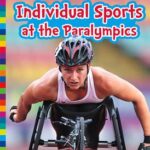 This standout series handles para athletics with the care and consideration it deserves. Readers will learn that para athletics has different sport classes. These divisions are maintained to keep the events fair based on the athletes’ impairments and how their individual impairments impact their ability to do their selected sport. Individual sports, like racing, cycling, archery, and the triathlon, can be done mostly alone, though some visually impaired athletes require a guide to race alongside them. Team sports are exciting too, whether it’s sitting volleyball, five-a-side (which is soccer with a noisemaking ball for visually impaired athletes), or goalball (which is similar to soccer dodgeball). Water sports and wheelchair sports can be performed individually or with teams. Readers will be inspired by the amazing athletes who work hard and win medals for their performances. (School Library Journal)
This standout series handles para athletics with the care and consideration it deserves. Readers will learn that para athletics has different sport classes. These divisions are maintained to keep the events fair based on the athletes’ impairments and how their individual impairments impact their ability to do their selected sport. Individual sports, like racing, cycling, archery, and the triathlon, can be done mostly alone, though some visually impaired athletes require a guide to race alongside them. Team sports are exciting too, whether it’s sitting volleyball, five-a-side (which is soccer with a noisemaking ball for visually impaired athletes), or goalball (which is similar to soccer dodgeball). Water sports and wheelchair sports can be performed individually or with teams. Readers will be inspired by the amazing athletes who work hard and win medals for their performances. (School Library Journal)
Adult Titles
This book provides parents and teachers of children on the autism spectrum (2-5 years) with strategies for promoting children’s optimal social, emotional, language, and academic competence. The author presents a variety of nonverbal and verbal strategies for caregivers to choose from in order to enter in children’s attention spotlight and expand their interest and joy in relationships with others. The book includes sample adult-child social and emotion coaching scripts for interacting with children and suggestions for modeling, imitating, and prompting social behaviors and joint activities. Also included are other connection and communication strategies such as sensory games, visual prompts and pictures, gestures, pretend and puppet play, and intentional communication.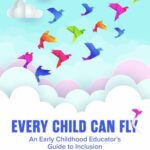 Every Child Can Fly: An Early Childhood Educator’s Guide to InclusionJani Kozlowski, experienced trainer and technical-assistance provider on inclusion and disability services, dispels the myths and shows that implementing high-quality inclusive practices in your program is easier than you think!Throughout Every Child Can Fly, Kozlowski explores the defining features of high-quality inclusion and shows readers how to provide access and support for children with disabilities. Learn how to help them feel included through strong family involvement, peer relationships, individualized teaching practices, collaborative teaming, ongoing evaluation, and staff professional development.
Every Child Can Fly: An Early Childhood Educator’s Guide to InclusionJani Kozlowski, experienced trainer and technical-assistance provider on inclusion and disability services, dispels the myths and shows that implementing high-quality inclusive practices in your program is easier than you think!Throughout Every Child Can Fly, Kozlowski explores the defining features of high-quality inclusion and shows readers how to provide access and support for children with disabilities. Learn how to help them feel included through strong family involvement, peer relationships, individualized teaching practices, collaborative teaming, ongoing evaluation, and staff professional development.
- Learn why inclusion is important
- Unravel the jargon and acronyms
- Understand screening, assessment, and referrals
- Learn how to support children in achieving individualized learning goals
- Explore inclusive evidence-based teaching practices
- Discover how to foster a sense of belonging and acceptance in your program
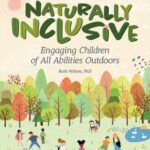 Naturally Inclusive: Engaging Children of All Abilities OutdoorsYoung children with special needs often face physical, emotional, or social barriers to deep engagement with the natural world. These challenges need not prevent them from enjoying the many benefits nature has to offer.Nature is a necessity. Research tells us that we are happier, healthier, more socially engaged, and more creative when it is part of our daily lives. These benefits apply to people of all ages and abilities.In this inspiring book, Dr. Ruth Wilson explores the great potential of connecting young children with special needs to the natural world. Drawing on her knowledge of research and her decades of work with children in nature, she weaves together advice, real-life examples, and testimonies from educators and families on the healing, nurturing power of nature in the lives of young children with diverse abilities.By Jennie Walker Knoot
Naturally Inclusive: Engaging Children of All Abilities OutdoorsYoung children with special needs often face physical, emotional, or social barriers to deep engagement with the natural world. These challenges need not prevent them from enjoying the many benefits nature has to offer.Nature is a necessity. Research tells us that we are happier, healthier, more socially engaged, and more creative when it is part of our daily lives. These benefits apply to people of all ages and abilities.In this inspiring book, Dr. Ruth Wilson explores the great potential of connecting young children with special needs to the natural world. Drawing on her knowledge of research and her decades of work with children in nature, she weaves together advice, real-life examples, and testimonies from educators and families on the healing, nurturing power of nature in the lives of young children with diverse abilities.By Jennie Walker Knoot

